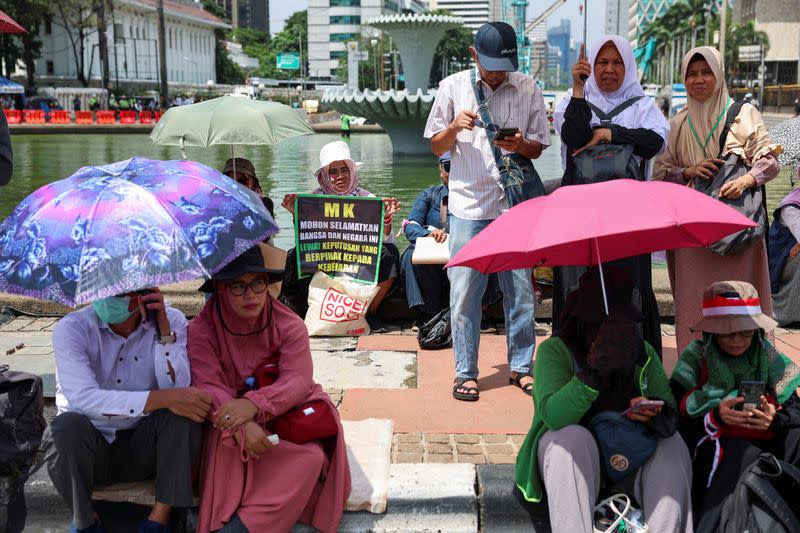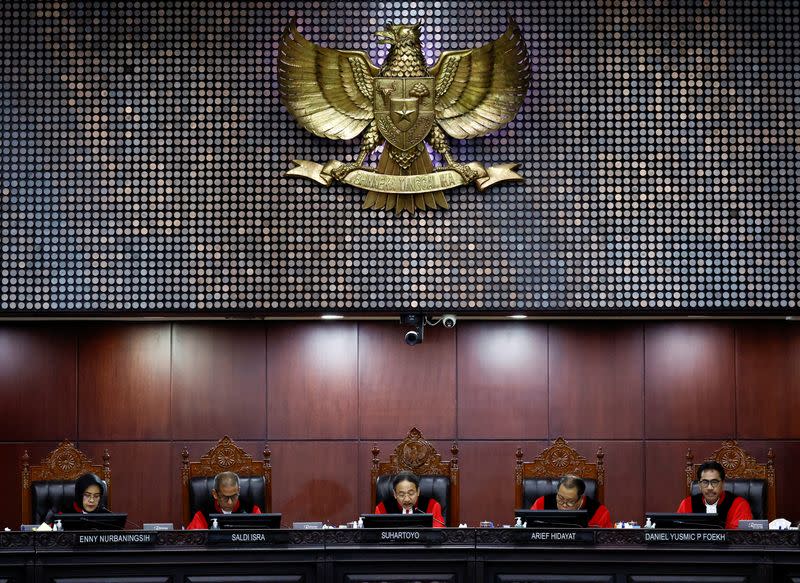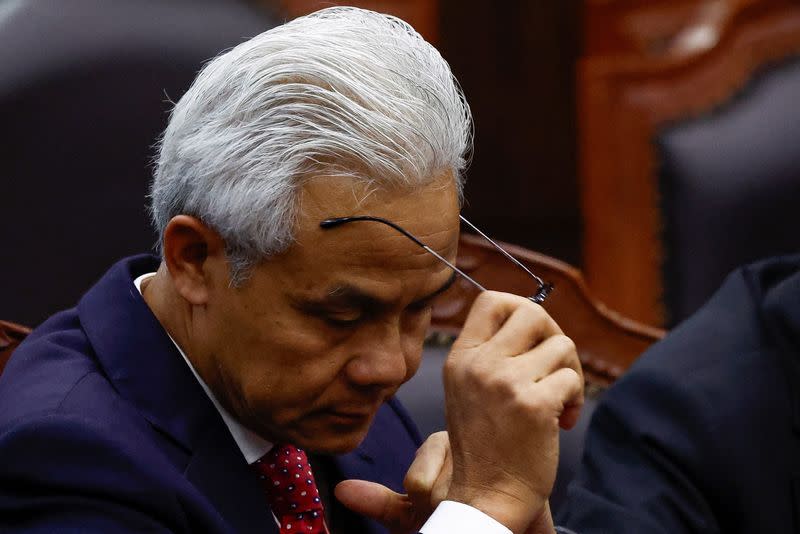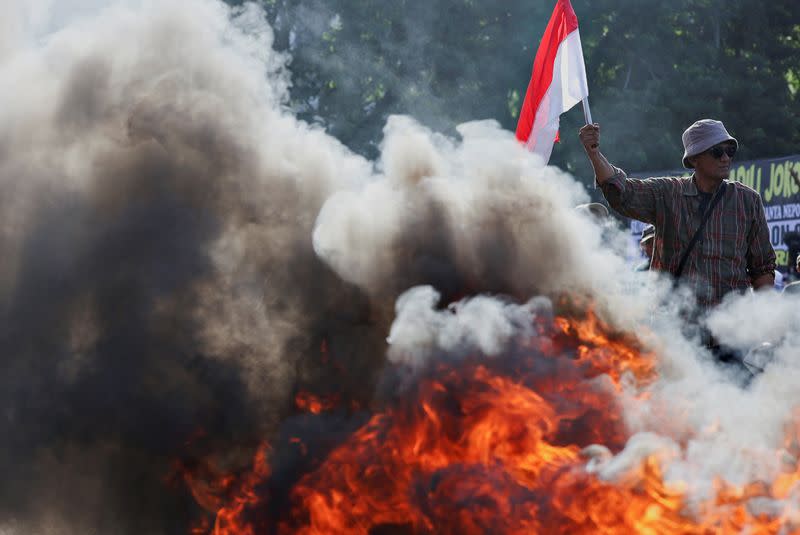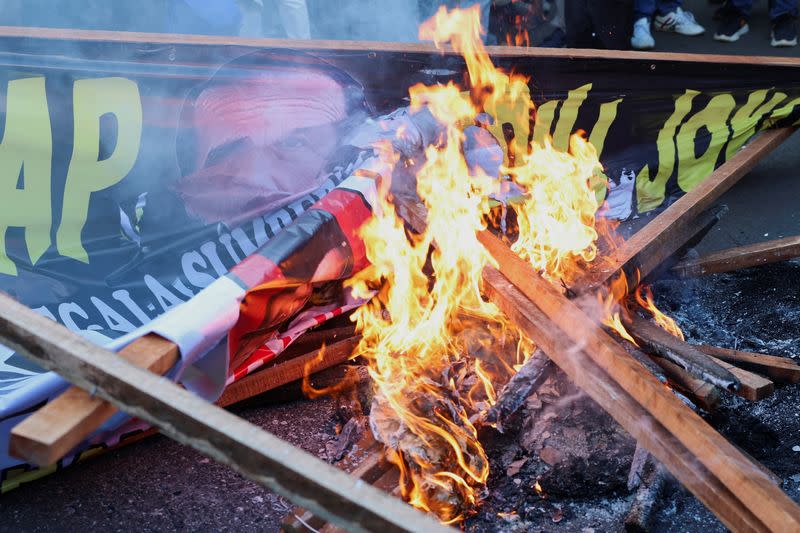Indonesia court rejects election challenges, upholds Prabowo's win
- Oops!Something went wrong.Please try again later.
- Oops!Something went wrong.Please try again later.
By Ananda Teresia and Stanley Widianto
JAKARTA (Reuters) - An Indonesian court on Monday rejected challenges from both losing candidates seeking a re-run of February's presidential election and the disqualification of winner Prabowo Subianto and his running mate, bringing an end to all election disputes.
The Constitutional Court ruled that there was no evidence of systematic fraud and presidential "meddling", nor that state bodies, regional officials and social assistance had been mobilised to sway polls in the world's third-largest democracy.
"The plaintiff's petition has no legal basis in its entirety," said Chief Justice Suhartoyo, announcing the decision for one former candidate, ex-Jakarta governor Anies Baswedan. The other former candidate to dispute the result was Ganjar Pranowo, a former Central Java governor.
Five judges ruled in favour of rejecting both petitions, with three dissenting opinions, he said.
The Constitutional Court's decisions are final and binding and both former candidates said they would respect the ruling, with Ganjar wishing luck to the "winner".
Anies said in a video address that he was committed to a peaceful governmental transition and called Prabowo a "patriot", adding that the court ruling marked the end of the election.
Otto Hasibuan, a lawyer for Prabowo's camp, said the ruling was "a victory for all Indonesians".
Prabowo, 72, is set to take office in October, replacing the hugely popular President Joko Widodo, better known as Jokowi.
The presidential palace respects the ruling and will help support the transition of the president-elect, palace spokesperson Ari Dwipayana said.
STATE INTERFERENCE
Anies and Ganjar had both separately alleged there was state interference to favour Prabowo, who won by a huge margin. They had also complained that Prabowo's running mate, the current president's 36-year-old son, should not have been allowed to take part.
In court, they had sought Prabowo's disqualification, arguing the government's widespread distribution of social aid, including handouts of rice, cash and fertiliser, in key areas had swayed the vote in his favour.
The administration and Prabowo rejected the allegations. During the court hearings, cabinet members denied that the aid had swayed voters while Prabowo, who won 58% of the vote, has dismissed the claim as baseless.
Judge Arief Hidayat, who cast one of the dissenting votes, had said the president and state agencies lacked neutrality.
Anies and Ganjar, who won about 25% and 16% of votes respectively, had also alleged that tacit support from Jokowi had gifted Prabowo an unfair advantage.
Jokowi came under intense scrutiny in the election run-up, with critics alleging he abused his position to favour Prabowo, with the aim of preserving his legacy after a decade in charge of Southeast Asia's biggest economy.
The losing candidates also complained to the Constitutional Court about the inclusion of Jokowi's son Gibran Rakabuming Raka as Prabowo's running mate, which was enabled by a decision in October by the same court to change eligibility rules.
The chief justice at the time was Jokowi's brother-in-law, who was later reprimanded by an ethics panel for allowing intervention from an unspecified "external party". He was barred from involvement in election-related cases.
Despite the ethical violation, the judges said on Monday there was no evidence of nepotism or presidential intervention in relation to that decision.
(Writing by Kate Lamb; Editing by Martin Petty, John Mair, Miral Fahmy and Gareth Jones)
